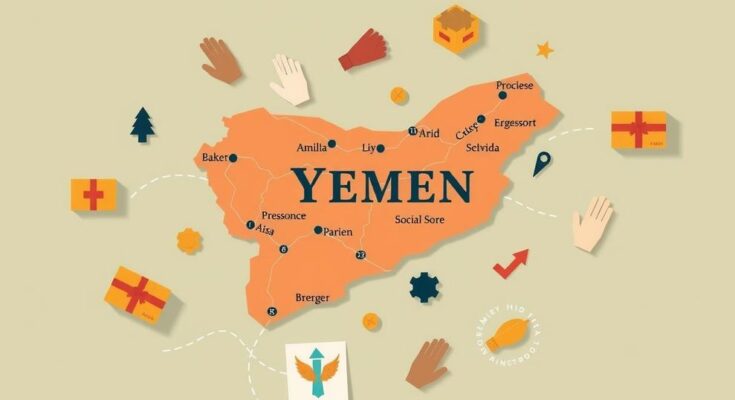The UNSC warns that Yemen continues to face severe conflict and humanitarian crises, with calls for a nationwide ceasefire. UN representatives highlight the worsening economic conditions and the effects of humanitarian aid cuts, particularly impacting women and children. The interplay of conflict and climate change further exacerbates Yemen’s situation, necessitating international cooperation and dialogue to restore peace. Members of the Council condemn the Houthis for detaining UN personnel while emphasizing the need for urgent action and support.
The United Nations Security Council (UNSC) has issued a warning regarding the ongoing conflict in Yemen, emphasizing the urgent need for a nationwide ceasefire. Hans Grundberg, the UN Special Envoy for Yemen, conveyed the deep frustration of Yemeni citizens amid a decade-long war, as economic conditions have significantly worsened with GDP per capita halving and a 50% drop in the value of the Yemeni rial in government-controlled areas. Although large-scale military operations ceased following the UN-mediated truce in April 2022, recent military activities in areas like Ma’rib and Ta’iz have raised alarms.
Grundberg highlighted the fragile situation, urging parties to negotiate a ceasefire and establish a political framework that includes a diverse representation of Yemenis. He pointed out that while there have been positive developments, such as the cessation of attacks by Ansar Allah on vessels, these must be sustained for peace efforts to succeed. “We owe it to the millions of Yemenis not to waver or falter in our determination on this,” he stated, emphasizing the importance of ongoing dialogue and opportunity for negotiations.
The humanitarian crisis in Yemen also demands immediate attention. Tom Fletcher, Under-Secretary-General for Humanitarian Affairs, stated that severe funding shortages have resulted in difficult choices for humanitarian operations, directly impacting lives. He expressed concern for the plight of women and girls, noting that 9.6 million are in dire need of assistance, with 1.5 million girls out of school. Fletcher warned that lack of funding could lead to a significant increase in vulnerable women resorting to survival tactics such as begging and trafficking.
Civil society perspectives were also presented, with Nesmah M. Ali from the Peace Track Initiative highlighting the compounded crises affecting Yemen, driven by both conflict and climate change. She stressed that environmental degradation, such as flooding and damage from warfare, has exacerbated the humanitarian needs. “I am a migrant of conflict and climate change,” she articulated, calling for increased focus on the gendered impacts of these crises.
The UNSC members expressed strong condemnation of the Houthis’ detention of UN personnel and the tragic consequences that have arisen from these actions. The representative from Panama called for the unconditional release of humanitarian workers, while other nations underscored the necessity for the Houthis to cease threats against aid workers. The United States further emphasized its commitment to countering Houthi actions through designating them as a terrorist organization but encouraged dialogue as a pathway for resolution.
Council members noted the interplay between climate change and security issues, with countries like Greece and Denmark urging the integration of climate considerations into peacebuilding efforts. Slovenia’s representative suggested that securing water resources is crucial for fostering dialogue and mutual understanding, underscoring women’s empowerment through these initiatives.
As Yemen enters its eleventh year of conflict, its representative called for international support, welcoming the US designation of the Houthis as a terrorist group while urging a strategic partnership to restore order and address Yemen’s institutional decay. The representative encouraged humanitarian organizations to relocate to Aden, as it serves as the temporary capital, to enhance aid efficiency.
The UNSC’s recent discussions highlight the critical and worsening humanitarian situation in Yemen, underpinned by a complex interplay of conflict and climate change. The urgent call for a nationwide ceasefire and enhanced humanitarian assistance is crucial for alleviating the suffering of the Yemeni population. Collaboration among international stakeholders, coupled with a commitment to women’s empowerment and resource security, is fundamental for achieving lasting peace and stability in Yemen.
Original Source: www.miragenews.com




